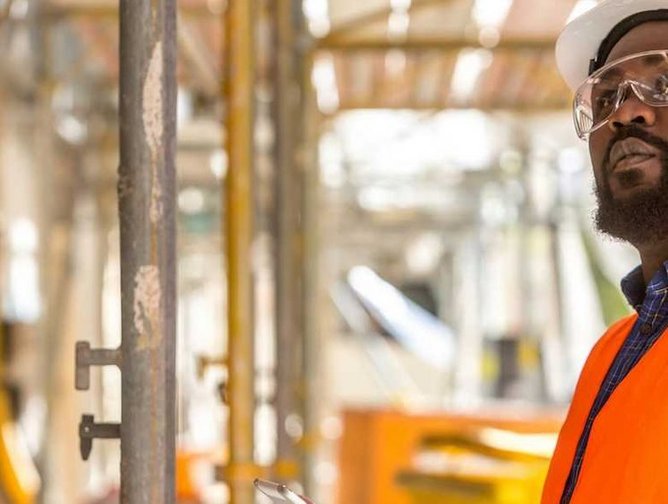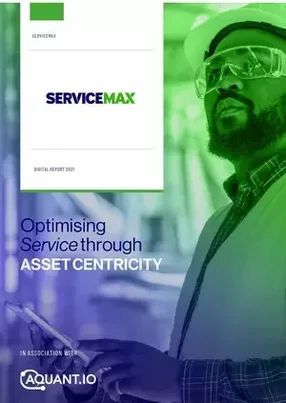ServiceMax: Optimising service through asset centricity
The beginnings of ServiceMax can be traced to Pleasanton, California, where co-founders Athani Krishnaprasad and Hari Subramanian started a software as a service (SaaS) company focused specifically on bringing modern tools to field service technicians, which was a gap in traditional customer relationship management (CRM) technology at the time. Originally called ‘Maxplore Technologies’, it was rebranded in 2009 to its current name, though its focus and dedication to improving field service management has remained the same. Offering customers an equipment-centric approach built on Salesforce cloud technology, ServiceMax can provide a complete view of assets to field service teams, providing technicians with the tools they need to ensure uptime on critical assets.
When Kieran Notter, VP of Customer Transformation, joined the company in 2016, he relates that the business immediately set itself apart: “I think it's quite an interesting group for a software company, because I'm not a software person; I come from a service background. ServiceMax is actually quite novel in that it wanted people from the service domain to help it create service products.” Although service is his current specialty, it was supply chain logistics to which Notter became accustomed to early in his career. It was attempting to reconcile these two sometimes mutually contradictory sectors, he explains, that fuelled his overall interest in field service management. “I needed to understand both and then try and find a mutually beneficial solution. Moving to a cost-centric approach made it very enjoyable. Technicians generally become technicians because they want to fix things.”
ServiceMax's pioneering adherence to improving customers’ service distinguished it from other software providers early on, and this dedication encompasses an ethos of specialisation. Not content to be a “jack of all trades”, Notter insists that it chooses to do one thing exceptionally and with authority, “Customers come to us for a perspective that is going to help them build their company. We challenge and help them deliver, using best practice all the way through.” ServiceMax’s mission statement - ‘We help our customers keep the world running’ - is more than just words, particularly as an increasing number of their clients have a role to play in the cold supply chain delivering COVID-19 vaccines; it is an enabler of superlative service that maintains the vitally important work of its customers.
Achieving this end, in Notter’s view, is contingent on encouraging ‘asset centricity’, a cultural shift that favours consulting asset-based data with greater diligence. In today’s environment, companies across all industries are rethinking their approach to service. Requirements for equipment performance have intensified, the pandemic has put more focus on outcomes, and customer expectations continue to rise. Organisations must advance beyond the standard ‘break-fix’ model to ensure uptime for important assets in a safe and compliant manner. Service teams must prioritise efficient asset performance, as well as the customer experience they provide.
“Factually, if you rely on people, studies have shown that humans tend to exaggerate, add their own bias, or forget information. The asset doesn't do that,” he explains. Praising this data for its capacity to encourage collaborative partnerships between ServiceMax and its customers, Notter states that this can make the difference between managing ‘potential failures’ proactively instead of solving ‘functional failures’ reactively.
“If you look at a car production line obviously the cars represent revenue, but if the production line fails a company can't produce cars. Therefore, if our client needed to increase the volume of cars to make more money, then the production needs to become more efficient. The only way to achieve that is to understand the asset and how it interacts with everything. A 360-degree view into the install base means customers gain granular insights around service contracts and asset performance to maximise equipment uptime and reduce maintenance costs. This advanced insight empowers customers to shift from selling products to adopting outcome-based strategies that propel businesses forward and help drive operational results.”
Focusing beyond cost, asset centricity, through improved product knowledge and workforce/technician distribution, can have a significant effect on maximising revenue streams. It’s a game-changing re-evaluation of service priorities and clearly identifies ServiceMax as a company that isn’t hesitant to try new ways of operating or addressing a problem. This philosophy served the company in 2020 when the COVID-19 pandemic disrupted industry norms and thrust remote working into the limelight.
“A lot of companies might have originally had only 5% of their work orders remotely fixed, but then, suddenly, they needed to do up to 95%. Those that started the digital transformation months or years before were much better placed to actually meet this remote need,” says Notter. ServiceMax was one such example; as a vendor of field service management solutions, it was devoid of any legacy infrastructure that might have encumbered field service teams and readily embraced Zoom for its customer-facing interactions and utilised tools from Salesforce and its own real-time communication tool, Zinc, to effortlessly transition into a remote working paradigm. Notter relates that this was also necessary to ensure ServiceMax practices what it preaches, “We can't go into an environment trying to sell digital transformation to a business if we haven't been on the journey ourselves.”
Although remote working methods could never replace the in-person ‘ride alongs’ that ServiceMax used to understand customers’ business objectives pre-COVID, Notter still praises the definite benefits that new workplace trends are bringing. For example, one of the current problems facing service providers is a rapidly aging workforce. Remote working gives older employees the ability to gain a better work-life balance and reduced physical strain. This development, he believes, will ultimately lead to greater knowledge retention within service companies generally and subsequently improve the training cycle for new employees.
Aquant: “A great partnership”
One of ServiceMax’s key digital transformation partners is predictive AI and workforce knowledge management company Aquant. Founded in 2016, this New York-based software specialist’s service intelligence platform is capable of learning its clients’ idiosyncrasies and building an AI-driven decision-making framework around them.
Providing essential analysis and unstructured data optimisation, the company strives to empower teams with enhanced problem solving, faster decisioning and more accurate results.
“What I like about working with the guys at Aquant is they don't just give you a solution: they actually help you mine and understand data,” says Notter. “It's a great partnership and it brings ServiceMax many different benefits.”
Reflecting on the rise of intelligent service chains, Notter states that the ability to collect, analyse and unlock the value of data will be crucial for the industry, particularly as data flows become increasingly complex and voluminous. “AI (artificial intelligence) is going to be hugely important because you need to grab that data and turn it into something actionable. 5G and IoT (internet of things) are also going to make a difference, and it’s great having all this technology, but understanding where and when to use it and how to grow with it is also vital.” This is where ServiceMax helps make a difference to its customers: by challenging thought processes behind the desire to implement new technologies, it can learn clients’ desired outcomes and guide their development accordingly. “There's no point in having the separate components of an intelligent service chain if you don't know how to use them,” emphasises Notter. “It should be about managing expectations and learning from other people's mistakes; you don't have to make your own mistakes to learn.”
Looking ahead to 2021, Notter says that the drive to continually improve the service of its customers will be ServiceMax’s main goal. With a headstart on its competitors in terms of tech infrastructure and cultural alignment, the company will be pressing forward to accentuate the importance of service and promoting the integrity of assets as a guide for optimising it. “We have to keep innovating our product to remain at the cutting edge of what's needed, making sure that it's both viable and available to any service business that requires it,” he concludes. “ServiceMax is customer obsessed. Therefore, our ultimate goal remains to help our customers keep the world running.”




